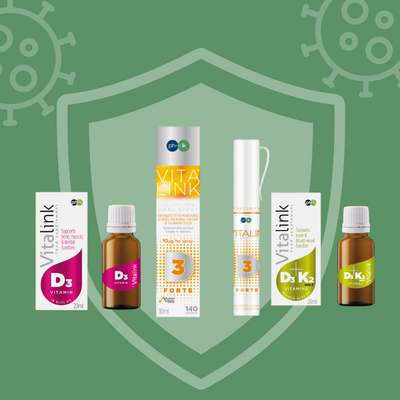Vitamin D deficiency is associated with increased COVID-19 severity and mortality

Optimal vitamin D levels help in reducing the susceptibility to respiratory infections and might be useful for the treatment of people who become infected with COVID-19.
Vitamin D is important for bone health, but it also has a role as an essential immunologic mediator having inhibitory effects on the production of pro-inflammatory cytokines, including TNF-alpha and IL-6. Therefore, low vitamin D status has been associated with a range of autoimmune, cardiovascular, and infectious diseases like influenza and respiratory viruses, including COVID-19 infection1.
Vitamin D can be produced in the skin through exposure to sunlight and, a person can also boost their vitamin D intake through certain foods or by taking vitamin D supplements. Vitamin D supplementation helps in reducing the susceptibility of developing flu by acting as a physical barrier against the infection, or through modulation of natural and/or adaptive immunity mechanisms to reduce the risk of infection. Vitamin D supplementation might be also useful to increase vitamin D levels for the treatment of people who become infected with COVID-192.
Vitamin D deficiency pre-COVID-19 infection increases disease severity and mortality risk
A retrospective study has demonstrated a correlation between deficiency of vitamin D before COVID-19 infection and increased COVID-19 severity and mortality during hospitalization. The study led by Amiel A. Dror, for the Department of Otolaryngology, Head and Neck Surgery of the Galilee Medical Center (Nahariya, Israel) examined the relationship between pre-infection serum level of 25-hydroxyvitamin D (25(OH)D) and disease severity and mortality due to SARS-CoV-23.
The authors evaluated 253 medical records of individuals with positive polymerase chain reaction (PCR) tests for SARS-CoV-2 and records of a 25(OH)D level before COVID-19 infection.
Vitamin D deficiency was associated with both severity and mortality of COVID-19 disease. Based on vitamin D levels prior to COVID-19 infection, patients with vitamin D deficiency (<20 ng/mL) were 14 times more likely to have severe or critical disease than patients with 25(OH)D ≥ 40 ng/mL (OR 14; 95% CI 4 to 51; p < 0.001).
Vitamin D supplementation
STE Pharmaceuticals offers a range of vitamin D3 supplement products, for vitamin D deficiency or as a dietary supplement:
Vitalynk D3 oral spray, Vitalynk D3 forte oral spray and Vitalynk D3 drops, food supplements based on vitamin D, which contributes to the normal function of the immune system and the maintenance of normal bones and muscle function.
Vitalynk D3+K2 drops, food supplement based on vitamin D and vitamin K. Vitamin K contributes to the maintenance of normal bones and normal blood clotting.
Both spray and drops are practical and innovative presentations that enable to reach the optimal level of vitamin D.
- Charoenngam N, Holick MF. Immunologic effects of vitamin d on human health and disease. Nutrients. 2020;12(7):2097
- Grant WB, Lahore H, McDonnell SL, et al. Evidence that vitamin D supplementation could reduce risk of influenza and COVID-19 infections and deaths. Nutrients. 2020; 12(4):988
- Dror AA, Morozov N, Daoud A, et al. Pre-infection 25-hydroxyvitamin D3 levels and assciation with severity of COVID-19 illness. PLoS ONE. 2022;17(2):e0263069
PRODUCTION PLANT
Ctra. De Valls
TV-2034 Km 6
43886 Vilabella
Tarragona, Spain.
© STE Pharmaceuticals 2024
